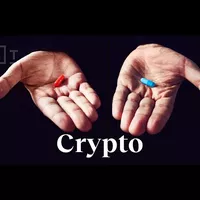Economist explains the two futures of crypto | Tyler Cowen
- All right.
So now let's move on to cryptocurrency.
You need to drink water or anything before we switch topics?
- Let's try crypto without water-
but we'll see.
- 'Crypto.'
- 'Crypto.'
- 'Crypto.'
- 'Cryptocurrency becomes more popular,
we're starting to see signs
that it could become part of our financial future.'
- Cryptocurrency is a truly new idea,
and it's rare that we have truly, fundamentally new ideas.
Think of Bitcoin as a kind of recordkeeping system,
and you pay people in Bitcoin to validate the records,
and you move on to the next day
and every day, every moment, you have a new set of records-
and this process is self-enforcing.
It cannot easily be overruled
by an outside authority or central authority.
So it's like you have, at the same time,
potentially a new kind of money,
a new kind of investment asset,
and also, actually, a new kind of computer.
So when I talk to people who are deeply into crypto,
I often feel quite skeptical.
They have such bold, grand plans,
and I'm not convinced they've thought through
how to carry it all out.
At the same time, I know many people
who dismiss crypto altogether.
They think it's a scam or a bubble or a fraud.
And when I talk to them, I feel quite bullish about crypto.
I see a lot of potential in the ideas,
but I don't think we know yet how useful crypto will be.
Here are some reasons why the crypto-skeptics are skeptical:
People use crypto to pay off ransoms.
Let's say hackers will go
into the medical records of a hospital,
pull out or lock or freeze that information,
and they won't give it back
until they're paid off in crypto.
You can't ever get your money back.
It's an irreversible transaction done on the blockchain.
That's the end of it.
Crypto itself, in most of its current forms,
it consumes a lot of energy.
You have computers racing to make calculations
to crack different kinds of cryptographic problems.
And those computers use so much energy
that it damages the environment through carbon emissions
in a way that we understand pretty well now.
But maybe the biggest reason to be crypto-skeptical
is simply that a lot of the promised benefits
haven't happened yet.
"Well, it's gonna make banking cheaper."
"It's gonna make finance cheaper."
"It's gonna make lending cheaper."
Maybe those dreams are just impossible,
or impossible anytime soon.
And if people are skeptical
about the promised benefits of crypto,
they have some good reasons to be skeptical.
Here's a way to think about 'the bullish case' for crypto:
Imagine that the internet
becomes more and more its own economy
with its own series of rules,
and that economy is a global one.
It will need its own systems of recordkeeping,
its own systems of property rights,
its own way of consummating transactions.
We'll need a new institution to do all those things,
and crypto is actually the best bet that we have.
If that occurs, and many people think it will,
it probably would be possible for me,
say, to take part of my checking account
and just by sending a single message,
lend some of it out to say, farmers in Kenya.
The world would be more global.
I would be better off. They would be better off.
There'd be this new system, some call it the 'Metaverse,'
others just call it the 'expanded internet,'
where we would own more things on the internet,
have these secure property rights
validated by the blockchain,
have new investment assets,
and moving resources around the world
would be much easier, cheaper.
That is speculative,
but it is not what I would call "crazy speculative."
It's a possibility,
and we're going to see if that's what's going to happen.

